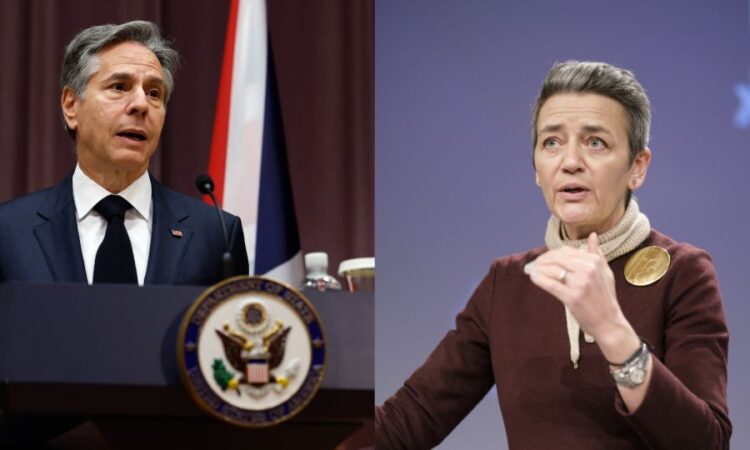
The European Union and the United States are set to commit to a collaborative approach in addressing concerns about China’s non-market practices and to synchronize their export controls on semiconductors and other goods, according to a preliminary statement from an upcoming meeting.
U.S. Secretary of State Antony Blinken, European Commission Vice-President Margrethe Vestager, and other high-ranking officials are scheduled to convene for the fourth iteration of the EU-U.S. Trade and Technology Council (TTC) in Lulea, Sweden, on May 30-31.
The early draft of the statement indicates that the two parties aim to discuss non-market practices and economic coercion. They plan to hold regular consultations on preventing their companies’ knowledge linked to outbound investment from bolstering the technological capabilities of strategic competitors, a veiled reference to China.
The statement also mentions plans to collaborate on their export controls on “sensitive items” that may have military uses, including semiconductors. The statement only refers to China indirectly and could be revised ahead of the meeting.
Brussels acknowledges China as a collaborator in certain areas, an economic competitor, and a strategic adversary. The European Union intends to reassess its China policy, realizing that alignment with a more assertive United States is crucial.
The document emphasizes the medical devices sector in China, stating that the transatlantic partners are “exploring possible actions” to counter the threats posed by non-market policies and practices.
In addition, the EU and the U.S. plan to join forces in combating foreign distortion of information, including “China’s amplification of Russian disinformation narratives about the war” in Ukraine.
Both parties also pledged their commitment to work with the G7 to coordinate measures against acts of economic coercion, such as the trade restrictions that the EU alleges China has imposed on EU member Lithuania.
source:
Reuters






